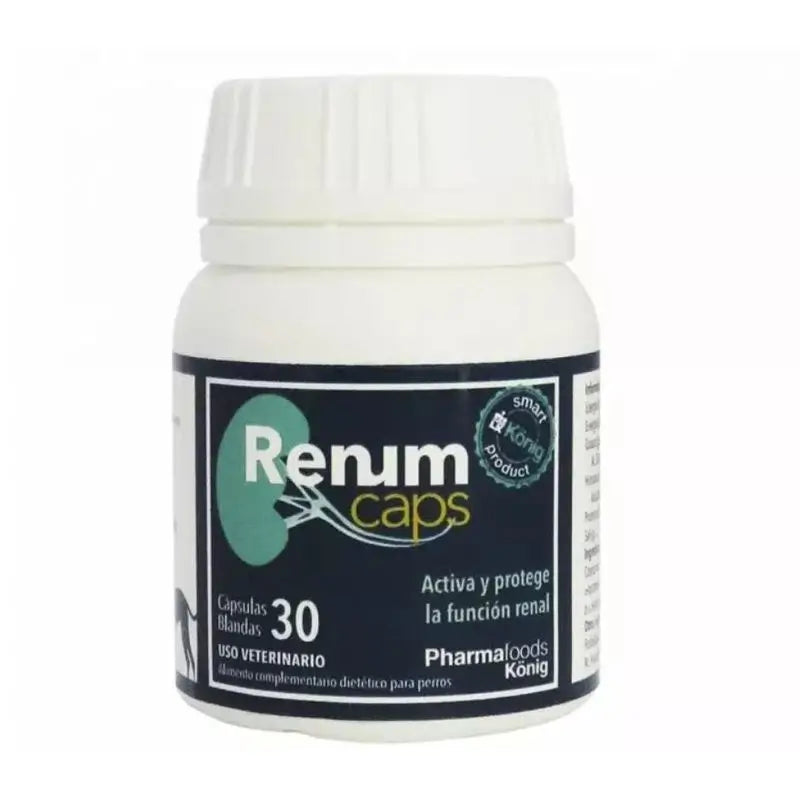Konig Renum is a supplement in capsule form designed to promote kidney and urinary health in dogs. It is formulated with natural ingredients to help maintain proper kidney function and prevent urinary problems. This product is a reliable option to take care of your pet's health and ensure the well-being of the renal and urinary system.


RENUM CAPS
Renum is a renal function protector.
It is composed of:
Coenzyme Q10 TRANS and tocopherols. The therapeutic target of this type of Coenzyme Q10 is the NOX4 enzyme system, which is mainly present in the kidney and is responsible for generating the imbalance that causes oxidative stress in the kidneys. There it corrects the functioning of the cellular respiration system by restoring the redox balance.
Tocopherols. They act at the LDL level, preventing lipid peroxidation. This is the name given to a chain of reactions generated by free radicals at the level of the cell membrane, modifying the structure of lipids, mainly unsaturated ones. This results in damage to the cell membrane and loss of its functions and consequent loss of cell function.
Vegetable and fish oils rich in polyunsaturated fatty acids. They act by protecting cell membranes and providing their structural components.
How is Renum presented?
Renum capsules: soft gelatin capsules (softgels). Packs of 30 and 90 capsules.
Renum drops: dropper bottle containing 15 ml.
How is Renum administered?
It is administered orally, directly into the animal's mouth or by emptying the contents into the feed.
What is the dosage?
Capsules
Dogs under 15 kg: 1 capsule/day.
Dogs from 15 to 30 Kg: 2 capsules/day
Dogs over 30 Kg: 3 capsules/day
Drops 5 drops /Kg
OXIDATIVE STRESS AND KIDNEY DISEASE
What is oxidative stress (OS)?
Oxidative stress describes the damage caused to various tissues and organs by free radicals. Free radicals represent a class of molecules derived from oxygen metabolism and exist in all organisms that use oxygen. Most are of endogenous origin and are by-products of normal and essential reactions, such as mitochondrial energy generation and detoxification reactions.
External factors include infections by bacteria, fungi and viruses.
Oxidative stress occurs in cells and tissues when there is a disturbance of the balance between pro-oxidant and antioxidant substances in favour of the former. The main oxidising substances in biological systems are oxygen-derived free radicals, also known as reactive oxygen species (ROS), which are intermediate molecules in chemical reactions and differ from other molecules in that they have orbitals with unpaired electrons. This makes them extraordinarily unstable and reactive, and their hunger for electrons to complete the orbital makes their attacks on other molecular structures very destructive.
Major ROS include superoxide anion (O2 -), hydrogen peroxide (H2O2), hydroxyl radical (OH), singlet oxygen (1O2- ) and hypochlorous acid (HOCL).
Oxidative stress in the kidney
Over the last decade, considerable effort has been devoted to investigating the role of free radicals in the development of disease.
In the case of the kidney, oxidative stress represents the common denominator in the mechanism of kidney damage caused by nephropathy of many different origins.
Thus, damage to the kidney exposed to ischaemia, nephrotoxic or infectious agents, as well as urinary tract obstructions, is associated with a pro-oxidant predominance over antioxidant defences.
A frequent target for attack by pro-oxidant agents is the lipids in the membranes of kidney cells, leading to their peroxidation. This lipoperoxidation compromises the integrity of the basement membrane and organ epithelium and may also affect the transport functions performed in the renal tubule.
Mechanisms of renal damage
The mechanisms by which ROS may contribute to the progression of kidney disease are as follows:
- Haemodynamically by damaging the characteristic properties of the glomerulus.
- By inducing uncoordinated and aberrant growth responses.
- By inducing loss of cell phenotype and apoptosis (self-induced cell death).
- By promoting acute and chronic inflammatory responses: oxidants can promote the adhesion of certain pro-inflammatory molecules and mediators that are clearly implicated in the progression of kidney disease.
In conclusion, we see that oxidative stress represents the common denominator of the mechanism of renal damage caused by nephropathies resulting from a wide range of aetiologies.Therefore, one way to protect the kidney from the risk of injury is to act through a mechanism that reduces the degree of oxidative stress that can affect it in pathological states.
One of the ways in which antioxidant substances (Vit. E) act is by positioning themselves on the surface of LDL molecules and thus contribute to the protection of the oxidisable groups of LDL against the action of free radicals.
The kidney's ability to defend itself against oxidative stress also depends on intracellular antioxidant defences. Mitochondria (intracellular organelle responsible for cellular respiration) and oxidative stress play a key role in the renal inflammatory process.
Coenzyme Q10 * plays an important role in the process of cellular respiration, increasing the production of ATP (the molecule that provides the energy needed to carry out the various cellular functions) and reducing the amount of free radicals (ROS).
*Coenzyme Q10 (CoQ10) is a mitochondrial coenzyme that is essential for the production of adenosine triphosphate (ATP), the body's form of chemical energy. The human body has about 100 trillion cells and each must produce its own energy to carry out its biological functions.
RENUM activates and protects kidney function
RENUM Capsules and RENUM drops combine the action of CoQ10 TRANS* with different types of tocopherols (a,ß,?,d). Due to its composition and characteristics, RENUM targets the NOX4 enzyme system, the expression of which is mainly found in the renal system.
Coenzyme Q10 trans: Coenzyme Q10 supplements can be CoQ10 trans obtained from natural sources by yeast fermentation, or CoQ10 cis trans, obtained by a process that produces the undesirable cis isomer (lower absorption and activity).
Presentation
Renum capsules 30 and 90 softgels, boxes of 15 units
Renum drops, 15 ml bottle, boxes of 12 units
